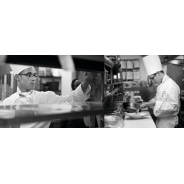
MAURIZIO FERRARESE OF QUATTRO IN HOUSTON'S FOUR SEASONS HOTEL
BCA: How does Italian food in the U.S. differ from Italian food in Italy?
MF: I am 100 percent Italian, born and raised in Italy. The food is very different. My first chef job in the U.S. was at the San Diego Four Seasons in 2002. I came there as the Italian chef for the fine dining restaurant. One day, a guest asked me to make fettucini alfredo. I couldn’t do it, so I asked another chef to make it.
He said, “You’re from Italy!”
I said, “Nuh uh. This is not an Italian dish.”
The eggplant parmesan in the U.S. is nothing like the eggplant parmesan in Italy. I cook it the way I was taught. I have guests that send back dishes sometimes because they aren’t used to the food. This why I like my job. I get to talk to the guests and explain the heritage.
In the States, people use Italian names to promote themselves. Like the word Tuscan - Tuscan chicken, Tuscan whatever. If you really know about Italian food, you’d know there is nothing about Tuscany in that dish. There are no differences between the Italian food I cook in my kitchen and the food in Italy.
Like risotto, it should be al dente. Risotto should have some crunch to it. If I comprise, I can’t show people what real Italian food is.
BCA: What are the pros and cons of working at a hotel restaurant?
MF: I’ve worked all around with the Four Seasons: California, Chicago, Miami, Hawaii, Budapest, London, Italy. Now I’m here in Houston. You could say kitchen philosophy is different in a hotel. You are comfortable. There are benefits. Clock in and clock out. It’s not a bad thing. It’s reliable work.
You have more chances to lose your job in a freestanding restaurant. There is no stability. That’s not necessarily why I do it. I do it because I love it. I also know my team loves it.
I have more than one way to express myself here. In the Four Seasons, there is an Italian restuarant and a sushi restaurant and a pool restaurant, room service and the bar restaurant, my banquet operation and cooking classes for guests. For me, it's amazing. I can express myself in different directions. Being the executive chef of the hotel, I’m in charge of every outlet.
BCA: Who was the first person to spark your interest in cooking?
MF: My mom loves cooking. She still does to this day. We used to have garden and a farm in Italy. My dad made his own wine. I remember I was 6 or 7-years-old and my mom was baking a cake. I sat in front of the oven on the floor. I could see the cake rising, getting bigger and bigger and bigger. I think I stared for 10 minutes. I was amazed.
Now, I understand the why behind it. Back then, I was so curious. I used to have chicken, rabbits and ducks and tomatoes all around my house. I wanted to mix everything together and learn about the reaction. There was a time when I decided to make food a career.
BCA: How would you elevate the same Italian dish from a casual to a fine dining level?
MF: We are in an upscale hotel with upscale clientele. Cooking contemporary Italian food gives me the opportunity to stick with simple, traditional Italian flavors and upgrade them with presentation and ingredients. For example: veal tonnato, a typical dish from Piedmont. It’s a slice of veal with mayonnaise-like sauce. That is the typical presentation.
I keep the same traditional flavors in my restaurant and upgrade the quality of the veal. I use filet instead of the leg, which I would have to tenderize and cook for hours to soften the muscle. Then, I lace the veal with fresh tuna carpaccio.




